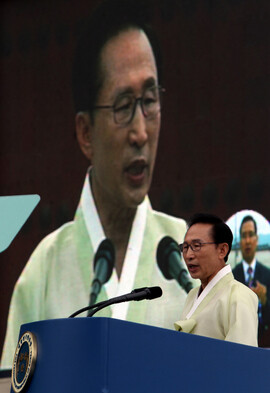hankyoreh
Links to other country sites 다른 나라 사이트 링크
Lee proposes unification tax

On August 15, President Lee Myung-bak suggested that discussions take place for the establishment of a “reunification tax,” in order to prepare financially for Korean unification.
President Lee gave an address entitled “United Citizens for a Greater Republic of Korea” at a ceremony to celebrate the 65th anniversary of Korean independence held at Gwanghwamun Square. He said that reunification is a certainty, and that he thought that the time had come to prepare practical plans, such as a reunification tax in preparation for the day when it occurred. He went on to suggest that people in all sectors of society hold broad discussions on the issue.
The current political climate with strained inter-Korean relations due to factors such as the Lee Myung-bak administration’s hardline North Korea stance and the Cheonan incident is expected to impact analysts’ interpretation of the reunification tax. Some analysts have interpreted it as a tax formulated in terms of unification by absorption, following a sudden change in North Korean political circumstances. It is also expected to cause disputes such as resistance from citizens facing a greater tax burden.
President Lee also said that inter-Korean relations now demanded a new paradigm and that South Korea’s goal must not be management of the current state of division but peaceful reunification. He suggested a three-stage reunification plan, whereby a “peace community” would be succeeded by an “economic community,” then a “national community.” Analysts have stated that this is no different from the existing “Denuclearization and Openness 3000” plan, whereby North Korea and South Korea gradually merge as South Korea provides economic support on the condition that the North Korea abandons its nuclear program.
Lee also explained that a “fair society” was the core value in working class-friendly, moderate and practical policies. He said that a fair society would provide the ethical and practical infrastructure for the development of South Korea, and that synergistic policies for big business and small and medium-sized enterprises (SMEs), reform of regulations, micro-finance and Sunshine Loans were specific means of achieving a fair society.
In reference to the electoral and administrative reform that he mentioned in his August 15 address last year, Lee said that these needed to be achieved as quickly as possible, in order to keep up with an era of rapid change. He reiterated his theoretical assertion that, if necessary, constitutional reform could also be discussed in the National Assembly.
In response to Japanese Prime Minister Kan Naoto’s apology for colonial on Aug. 10, Lee said that this was the first time a Japanese leader had reflected upon colonial rule acknowledging that it was against the will of the Korean people, and apologized. Lee said he judged this to be an effort on the part of Japan to take a major step forward. The president also said that South Korea and Japan must now take specific and practical action for the next 100 years of mutual relations.
Ahn Hyung-hwan, spokesman of the ruling Grand National Party (GNP), said that he welcomed the president’s emphasis on the achievement of a fair society as having raised a new talking point.
On the other hand, Cho Young-teck, spokesman of the main opposition Democratic Party (DP), criticized Lee‘s suggestion of a reunification tax, saying that the resumption of rice aid to North Korea and an announcement of fulfilling the promises made in the June 15 and October 4 declarations should come first.
Woo Wi-yeong, spokesman of the minor opposition Democratic Labor Party (DLP), criticized Lee’s “Three-stage Reunification Plan,” saying that as long as the government retained the “Denuclearization and Openness 3000” plan, the root of its hardline policy toward North Korea, these were no more than empty words.
Please direct questions or comments to [englishhani@hani.co.kr]
Editorial・opinion
![[Column] Has Korea, too, crossed the Rubicon on China? [Column] Has Korea, too, crossed the Rubicon on China?](https://flexible.img.hani.co.kr/flexible/normal/500/300/imgdb/original/2024/0419/9317135153409185.jpg) [Column] Has Korea, too, crossed the Rubicon on China?
[Column] Has Korea, too, crossed the Rubicon on China?![[Correspondent’s column] In Japan’s alliance with US, echoes of its past alliances with UK [Correspondent’s column] In Japan’s alliance with US, echoes of its past alliances with UK](https://flexible.img.hani.co.kr/flexible/normal/500/300/imgdb/original/2024/0419/2317135166563519.jpg) [Correspondent’s column] In Japan’s alliance with US, echoes of its past alliances with UK
[Correspondent’s column] In Japan’s alliance with US, echoes of its past alliances with UK- [Editorial] Does Yoon think the Korean public is wrong?
- [Editorial] As it bolsters its alliance with US, Japan must be accountable for past
- [Guest essay] Amending the Constitution is Yoon’s key to leaving office in public’s good graces
- [Editorial] 10 years on, lessons of Sewol tragedy must never be forgotten
- [Column] A death blow to Korea’s prosecutor politics
- [Correspondent’s column] The US and the end of Japanese pacifism
- [Guest essay] How Korea turned its trainee doctors into monsters
- [Guest essay] As someone who helped forge Seoul-Moscow ties, their status today troubles me
Most viewed articles
- 1[Column] The clock is ticking for Korea’s first lady
- 2After 2 months of delayed, denied medical care, Koreans worry worst may be yet to come
- 3US overtakes China as Korea’s top export market, prompting trade sanction jitters
- 4[Column] Has Korea, too, crossed the Rubicon on China?
- 5[Correspondent’s column] In Japan’s alliance with US, echoes of its past alliances with UK
- 6Hong Se-hwa, voice for tolerance whose memoir of exile touched a chord, dies at 76
- 7[Editorial] When the choice is kids or career, Korea will never overcome birth rate woes
- 8Samsung barricades office as unionized workers strike for better conditions
- 9All eyes on Xiaomi after it pulls off EV that Apple couldn’t
- 10More South Koreans, particularly the young, are leaving their religions